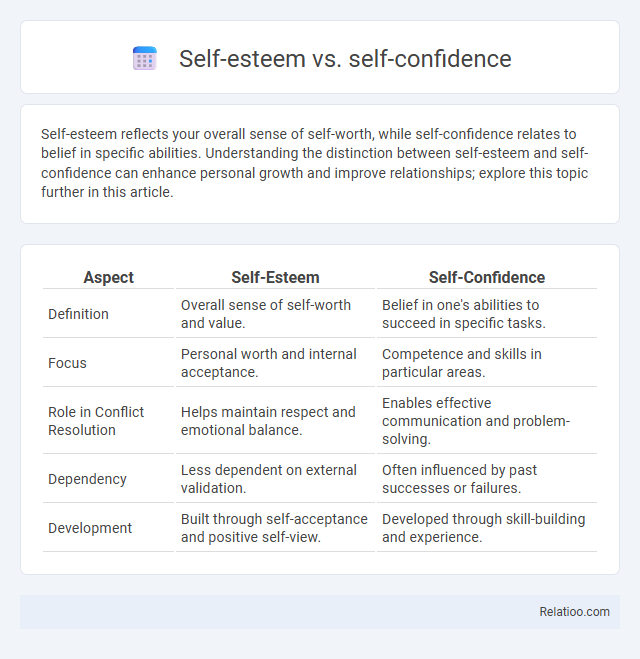Self-esteem reflects your overall sense of self-worth, while self-confidence relates to belief in specific abilities. Understanding the distinction between self-esteem and self-confidence can enhance personal growth and improve relationships; explore this topic further in this article.
Table of Comparison
| Aspect | Self-Esteem | Self-Confidence |
|---|---|---|
| Definition | Overall sense of self-worth and value. | Belief in one's abilities to succeed in specific tasks. |
| Focus | Personal worth and internal acceptance. | Competence and skills in particular areas. |
| Role in Conflict Resolution | Helps maintain respect and emotional balance. | Enables effective communication and problem-solving. |
| Dependency | Less dependent on external validation. | Often influenced by past successes or failures. |
| Development | Built through self-acceptance and positive self-view. | Developed through skill-building and experience. |
Understanding Self-Esteem: Definition and Importance
Self-esteem refers to an individual's overall subjective evaluation of their worth and value, influencing mental health and emotional resilience. High self-esteem fosters positive self-image and motivation, while low self-esteem can lead to anxiety, depression, and diminished life satisfaction. Understanding self-esteem is crucial for personal development, as it shapes behavior, interpersonal relationships, and the ability to cope with challenges.
What is Self-Confidence? Key Traits and Benefits
Self-confidence refers to an individual's belief in their abilities to succeed in specific situations or accomplish tasks. Key traits of self-confidence include resilience, assertiveness, and a positive mindset, which empower individuals to take on challenges and learn from failures. Benefits of self-confidence encompass improved decision-making, enhanced performance, and greater social influence, contributing to overall personal and professional growth.
Core Differences Between Self-Esteem and Self-Confidence
Self-esteem refers to the overall sense of self-worth and value one places on themselves, whereas self-confidence is the belief in one's abilities to succeed in specific tasks or situations. Core differences highlight that self-esteem is more global and stable, encompassing feelings of self-respect and acceptance, while self-confidence is situational and can fluctuate based on experience or skill level. Understanding these distinctions is crucial for personal development, as high self-esteem fosters inner peace and resilience, whereas high self-confidence drives motivation and achievement in targeted areas.
How Self-Esteem Shapes Our Perceptions
Self-esteem fundamentally shapes your perceptions by influencing how you value yourself and interpret experiences, impacting your emotional resilience and decision-making. Unlike self-confidence, which refers to belief in specific abilities or skills, self-esteem reflects your overall sense of self-worth and acceptance. Understanding the distinction between self-esteem and self-confidence helps clarify why high self-esteem often leads to more positive perceptions of challenges and interpersonal interactions.
The Role of Self-Confidence in Everyday Life
Self-confidence plays a crucial role in everyday life by enabling you to take on challenges, make decisions, and engage socially with ease. Unlike self-esteem, which reflects your overall sense of self-worth, self-confidence specifically relates to your belief in your abilities to perform tasks successfully. Building strong self-confidence can lead to improved performance at work, better relationships, and a greater willingness to pursue personal goals.
Factors Influencing Self-Esteem vs Self-Confidence
Self-esteem is influenced by internal factors such as personal values, past experiences, and self-perception, while self-confidence primarily depends on external achievements, skills, and feedback from others. Your self-esteem often reflects your overall sense of worth, shaped by emotional and psychological factors, whereas self-confidence relates more to your belief in specific abilities and tasks. Understanding these distinctions helps you develop both constructs by targeting the underlying factors influencing each.
Signs of Healthy Self-Esteem and Strong Self-Confidence
Signs of healthy self-esteem include a realistic self-view, acceptance of strengths and weaknesses, and resilience in the face of setbacks. Strong self-confidence is demonstrated through assertive communication, willingness to take on new challenges, and consistent achievement of goals. Both attributes contribute to emotional well-being, influencing personal and professional success.
Common Myths About Self-Esteem and Self-Confidence
Self-esteem and self-confidence are often mistakenly seen as identical, but self-esteem refers to your overall sense of self-worth, while self-confidence relates to belief in your abilities. A common myth is that high self-esteem means never feeling doubt, when in fact, healthy self-esteem allows you to accept imperfections and learn from failures. Dispelling misconceptions about these concepts can empower you to build a balanced self-image and stronger personal resilience.
Practical Tips to Boost Both Self-Esteem and Self-Confidence
Boosting your self-esteem and self-confidence involves practical steps such as setting achievable goals, practicing positive self-talk, and celebrating small successes to reinforce your sense of worth and capability. Engage in activities that challenge your skills while providing opportunities for growth, helping to build confidence through experience and accomplishment. Consistent self-reflection and surrounding yourself with supportive individuals further enhance your belief in your abilities and value.
Self-Esteem vs Self-Confidence: Which Matters More?
Self-esteem and self-confidence, while interconnected, differ fundamentally: self-esteem reflects one's overall sense of self-worth, whereas self-confidence pertains to belief in specific abilities or tasks. Research indicates that higher self-esteem often correlates with better mental health and resilience, making it a foundational element for well-being. Although self-confidence facilitates goal achievement and skill performance, fostering self-esteem proves more critical for long-term psychological stability and personal fulfillment.

Infographic: Self-esteem vs Self-confidence
 relatioo.com
relatioo.com